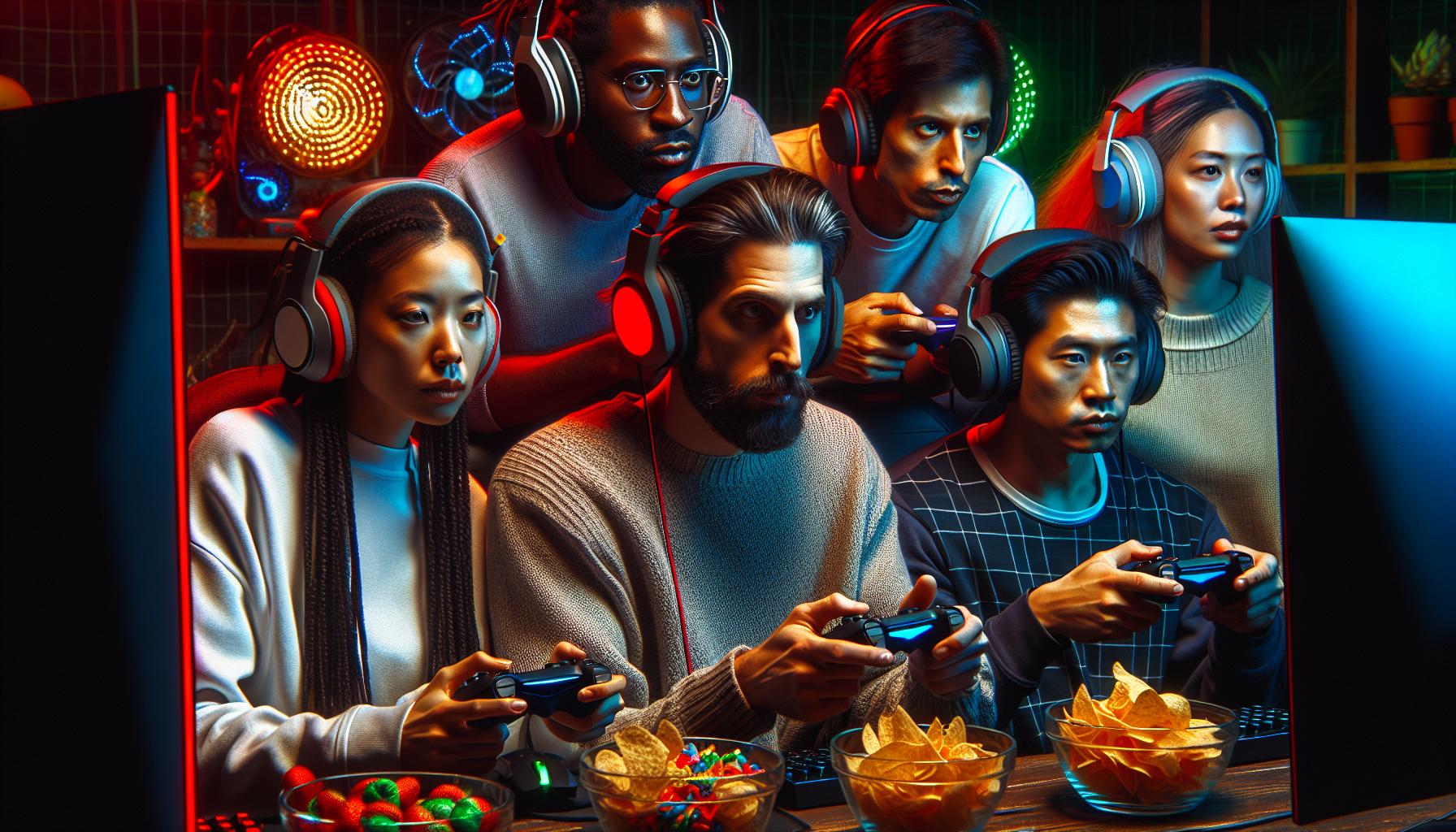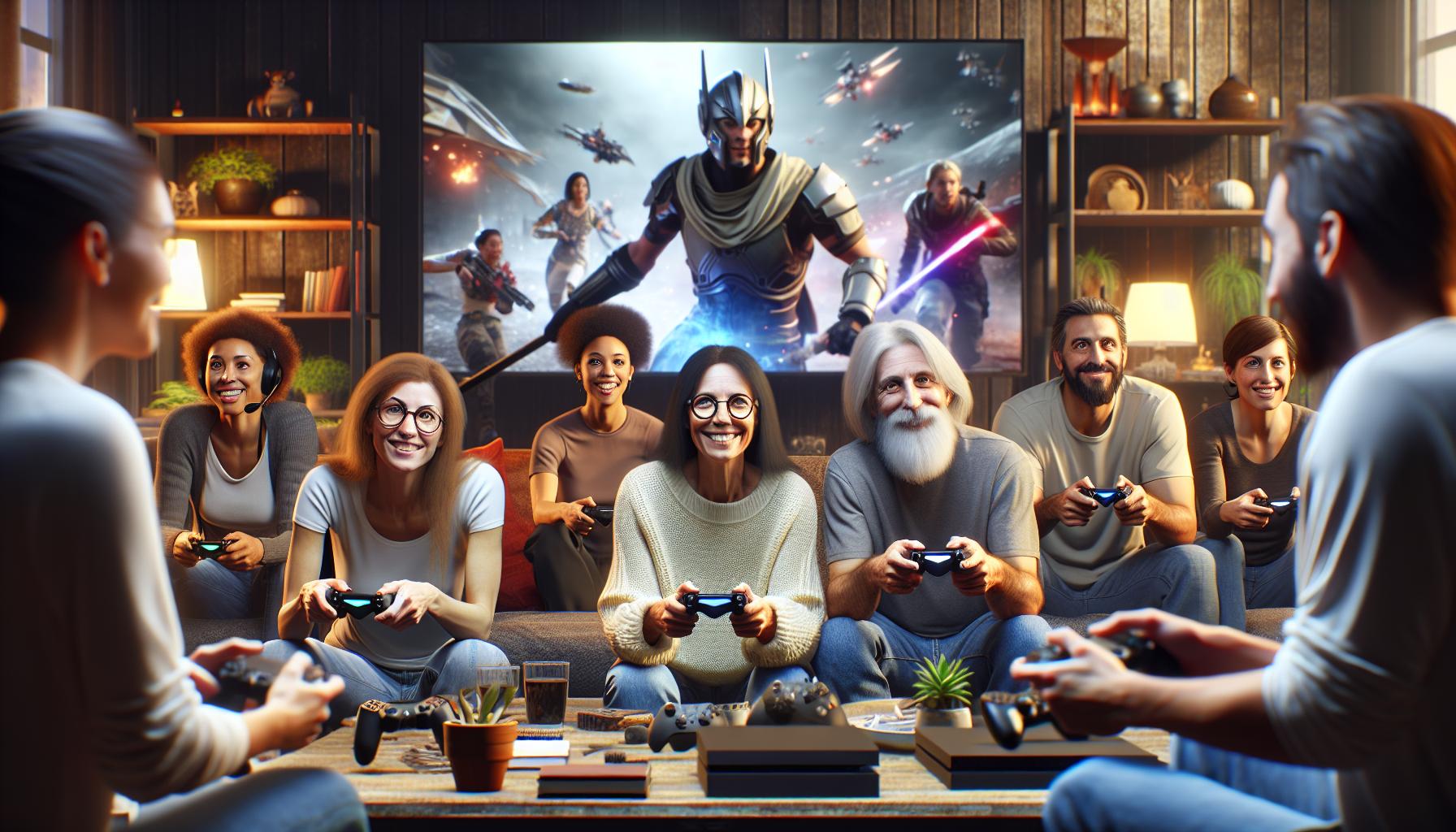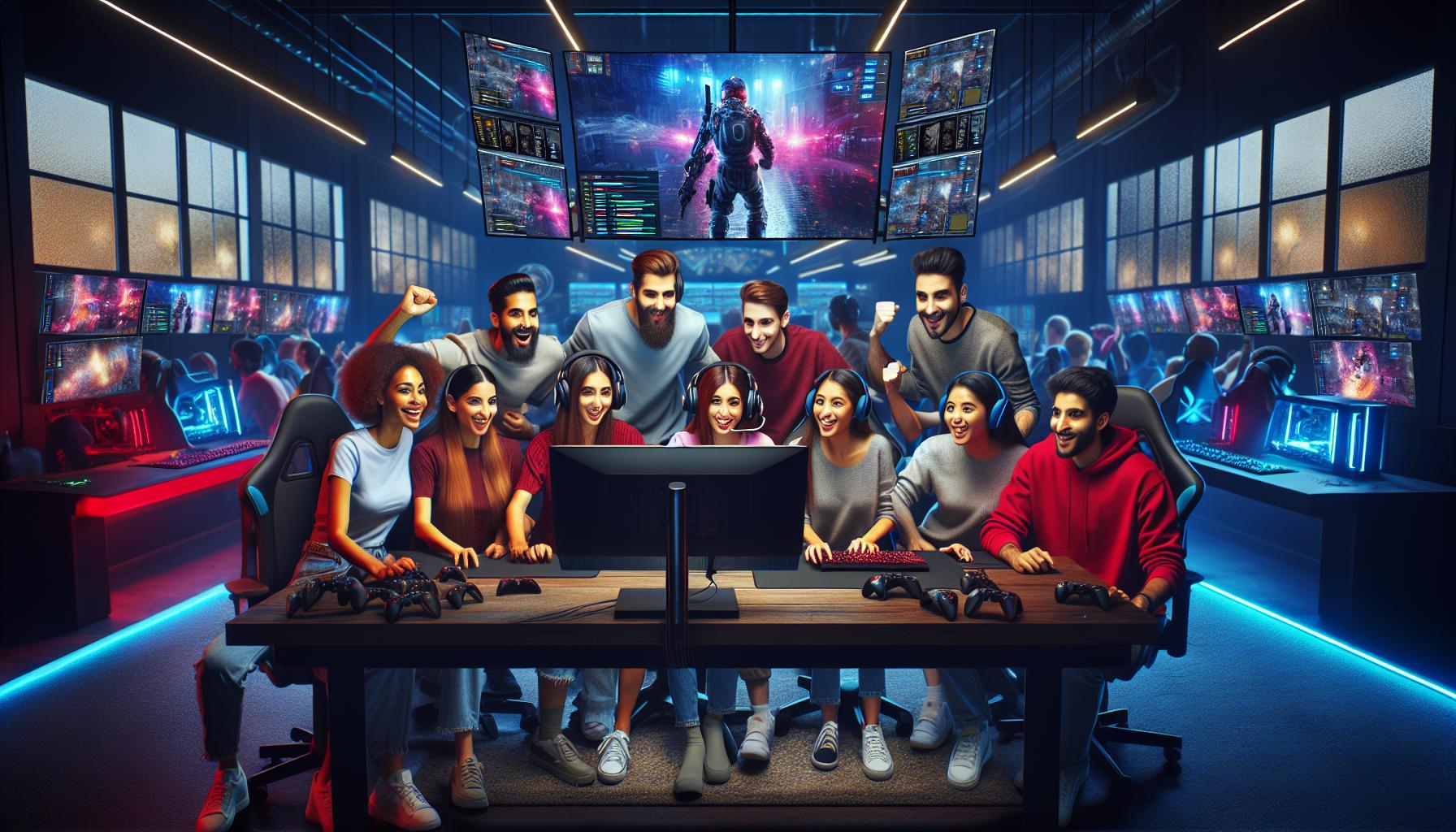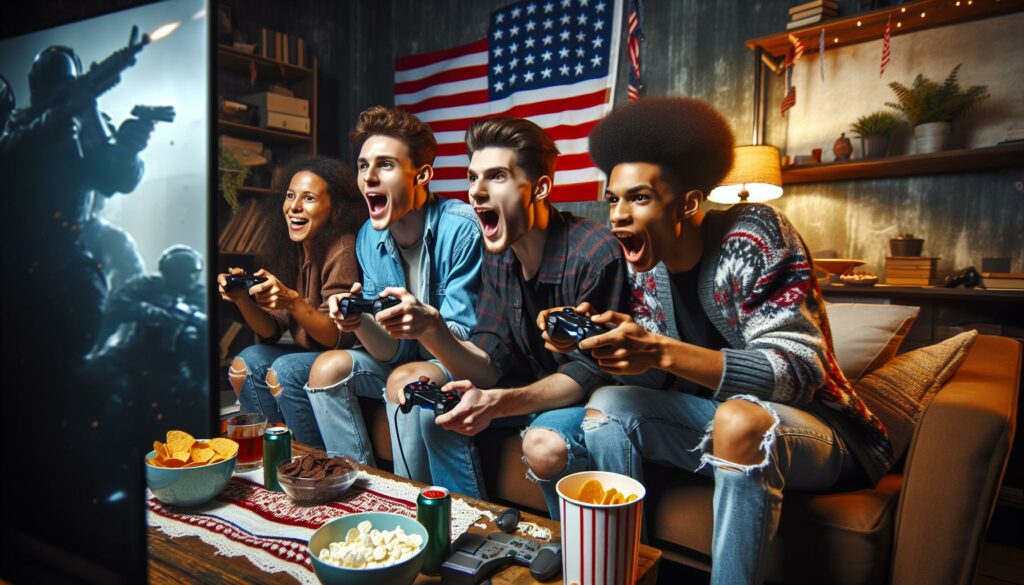Gaming (Gaming Culture) has evolved from a niche hobby into a global cultural phenomenon that shapes entertainment social connections and even professional careers. What started with simple pixelated characters bouncing across screens has transformed into immersive virtual worlds where millions of players connect compete and create communities.
Today’s gaming culture extends far beyond just playing games. It encompasses streaming platforms esports tournaments cosplay events and countless online communities where gamers share experiences strategies and creative content. From casual mobile gamers to professional esports athletes the gaming community has become one of the most diverse and inclusive spaces in modern entertainment. This digital revolution has redefined how people interact socialize and even make a living in the 21st century.
Gaming (Gaming Culture)
Gaming culture transformed from arcade gatherings in the 1970s into a global digital phenomenon connecting millions of players worldwide. Social platforms like Discord link 140 million monthly active gamers through dedicated communities centered around specific games genres.
Digital marketplaces revolutionized game distribution with platforms like Steam hosting 50,000+ titles accessible to 120 million monthly active users. Mobile gaming expanded the demographic reach with 2.5 billion smartphone players participating in casual gaming communities.
Live streaming platforms shaped modern gaming culture through interactive entertainment:
- Twitch attracts 31 million daily viewers watching gaming content
- YouTube Gaming generates 100 billion hours of gaming video views annually
- Facebook Gaming connects 400 million monthly active gaming viewers
Esports elevated competitive gaming into a professional industry:
| Category | Statistics |
|---|---|
| Global Audience | 532 million viewers |
| Prize Pools | $1.1 billion annually |
| Pro Players | 27,000 registered |
Gaming conventions foster in-person cultural exchanges:
- PAX events draw 180,000 attendees annually
- Gamescom attracts 370,000 visitors from 100+ countries
- Tokyo Game Show unites 250,000 gaming enthusiasts
Online gaming communities expanded beyond gameplay through:
- Fan art communities sharing 500,000+ creative works monthly
- Modding groups developing 100,000+ game modifications yearly
- Speedrunning competitions drawing 150,000+ concurrent viewers
This cultural evolution established gaming as a mainstream form of entertainment transcending age gender geographic boundaries.
Gaming Communities and Social Connection

Gaming communities form interconnected networks where players share experiences, strategies, and cultural touchstones across digital platforms. These spaces foster relationships through shared gaming interests while creating lasting social bonds.
Online Gaming Networks
Discord serves as a central hub for gaming communities with 150 million monthly active users engaging in voice chats, text channels, and shared gaming sessions. Steam Community connects 120 million players through game-specific discussion boards, user reviews, and workshop content creation. PlayStation Network and Xbox Live unite console gamers through friends lists, party systems, and multiplayer lobbies, facilitating cross-platform play in popular titles like Fortnite, Rocket League, and Call of Duty. Gaming forums like Reddit’s r/gaming host 33 million members who share gameplay clips, industry news, and fan creations.
Esports and Competitive Gaming
Major esports titles attract massive competitive communities, with League of Legends registering 180 million monthly players across organized leagues and casual matches. Professional teams compete in structured tournaments featuring prize pools up to $40 million, as seen in Dota 2’s The International. Regional leagues like the LCS (North America) and LEC (Europe) maintain regular seasons with professional broadcasts reaching 1.2 million concurrent viewers. Amateur circuits on platforms like FACEIT and ESEA provide competitive ladders for aspiring players, hosting 20 million registered users across multiple game titles. Tournament organizers ESL and DreamHack host 20 premier events annually, combining competitive matches with fan festivals.
Gaming Identity and Demographics

Gaming demographics reflect a diverse ecosystem of players across different age groups, genders, ethnicities, and cultural backgrounds. Modern gaming communities embrace inclusivity and representation, challenging traditional stereotypes about who plays video games.
Breaking Gender Stereotypes
Female gamers constitute 45% of the gaming population, marking a significant shift in player demographics. The rise of women in gaming extends beyond casual mobile games to competitive esports, with professional players like Sasha “Scarlett” Hostyn earning over $400,000 in tournament winnings. Female streamers generate substantial viewership on platforms like Twitch, where top creators attract millions of followers. Game developers now prioritize diverse character representation, with titles like Horizon Zero Dawn featuring strong female protagonists. Gaming organizations actively promote inclusivity through initiatives such as Girls Who Code gaming programs and women-focused tournaments with dedicated prize pools.
Age Diversity in Gaming
The average age of gamers spans multiple generations, with 38 years being the median age for video game players. Adults aged 35-54 represent 26% of the gaming population, while players over 65 make up 7% of active gamers. Mobile gaming attracts diverse age groups, with 70% of players aged 55 and older engaging through smartphone applications. Multigenerational gaming communities thrive in MMORPGs like World of Warcraft, where guilds often include members across different age brackets. The accessibility of gaming platforms enables seniors to maintain cognitive skills through brain training games, with platforms like Lumosity reporting 100 million users across age demographics.
The Impact of Streaming and Content Creation

Streaming platforms transformed gaming into a spectator activity, generating $28 billion in revenue across major platforms in 2022. This shift created new opportunities for content creators while reshaping how audiences engage with gaming content.
Rise of Gaming Influencers
Gaming influencers attract massive followings through unique content creation styles. Prominent creators like PewDiePie maintain 111 million YouTube subscribers, while Ninja generates $500,000 monthly through streaming partnerships. Top gaming influencers leverage multiple platforms, creating diversified content through gameplay sessions, tutorials, reviews, and entertainment videos. Micro-influencers focus on specific niches, building dedicated communities around games like Minecraft, Fortnite, or League of Legends. Gaming personalities drive market trends, with 82% of viewers making purchases based on influencer recommendations.
Platforms Shaping Gaming Culture
Live streaming platforms revolutionized gaming content consumption patterns. Twitch leads with 31 million daily visitors averaging 95 minutes of watch time per session. YouTube Gaming captures 800 billion gaming-related views annually through archived content, tutorials, and live streams. Facebook Gaming expanded the streaming ecosystem by focusing on mobile gaming communities. These platforms introduced features like channel points, subscriber-only chats, and donation systems that enhance viewer engagement. Cross-platform integration enables content creators to reach broader audiences while maintaining consistent brand presence across multiple channels.
| Platform | Key Metrics |
|---|---|
| Twitch | 31M daily visitors |
| YouTube Gaming | 800B annual gaming views |
| Gaming Influencers | $500K monthly earnings (top tier) |
| Viewer Engagement | 95 minutes average watch time |
| Purchase Impact | 82% conversion rate |
Gaming as a Cultural Force
Gaming shapes modern society through its influence on entertainment media social norms digital interactions. The gaming industry’s cultural impact extends beyond traditional entertainment boundaries into art fashion education technology.
Gaming’s Influence on Modern Entertainment
Digital gaming experiences drive innovation across entertainment sectors. Netflix incorporates interactive elements in shows like “Black Mirror: Bandersnatch” attracting 5 million viewers. Popular games inspire successful entertainment adaptations including “The Last of Us” series with 30 million viewers worldwide. Gaming mechanics appear in fitness apps education platforms digital marketing campaigns creating engaging user experiences.
Major film studios integrate gaming aesthetics in productions with movies like “Ready Player One” generating $582 million globally. The soundtrack industry embraces gaming music with orchestral performances of game scores selling out venues like London’s Royal Albert Hall. Gaming concepts influence theme park attractions with Nintendo’s Universal Studios partnership attracting 12 million visitors annually.
Gaming Representation in Mainstream Media
Media coverage of Gaming (Gaming Culture) evolved from niche reporting to mainstream news features. The New York Times dedicates regular columns to gaming culture reaching 9.2 million daily readers. Television networks broadcast esports tournaments with ESPN securing 5 million viewers for major championships. Social media platforms feature dedicated gaming sections with Facebook Gaming reaching 720 million users monthly.
Popular culture incorporates gaming references in TV shows movies music videos. Celebrity gamers like Henry Cavill Drake Post Malone promote gaming culture to diverse audiences. Gaming personalities appear on mainstream talk shows with appearances on Jimmy Fallon averaging 2.5 million viewers. Digital publications dedicate significant coverage to gaming news reviews cultural analysis reaching 45 million monthly readers across platforms.
Gaming Terminology and Communication
Gaming culture encompasses a unique lexicon evolved from millions of player interactions across digital platforms. This specialized language creates distinctive communication patterns that shape online gaming communities.
Gamer Slang and Language
Gaming terminology reflects the fast-paced nature of digital interaction with specific terms for different gameplay scenarios. Common phrases like “GG” (good game) “AFK” (away from keyboard) establish universal gaming etiquette across platforms. Competitive gaming introduces tactical terms such as “camping” “rushing” “kiting” to describe specific strategies. MMORPGs feature specialized terminology for group activities: “tanking” “DPS” “aggro” define player roles during raids. FPS games utilize callouts like “flanking” “pushing” “rotating” to coordinate team movements. Professional esports communities develop advanced vocabulary including “meta” “rotation” “economy” to analyze high-level gameplay mechanics.
Meme Culture in Gaming
Gaming memes emerge from shared experiences memorable moments within popular titles. Iconic phrases like “The cake is a lie” from Portal “Arrow to the knee” from Skyrim become cultural touchstones. Streaming platforms generate viral moments through player reactions glitches unexpected gameplay outcomes. Gaming communities on Reddit Discord spread memes through dedicated channels reaching millions of users daily. Popular formats include screenshot edits gameplay clips reaction images that reference specific game mechanics or events. Esports tournaments produce memorable moments that transform into widespread memes affecting gaming discourse across platforms. Major gaming companies embrace meme culture incorporating popular references into marketing campaigns game updates.
Cultural Challenges and Controversies
Gaming culture faces significant challenges that impact its growth and accessibility. These issues range from behavioral concerns within gaming communities to health-related impacts on players.
Toxicity and Inclusivity
Online gaming environments experience toxicity through harassment, hate speech and discriminatory behavior. A 2022 Anti-Defamation League study revealed 83% of adult gamers faced harassment, with marginalized groups receiving disproportionate targeting. Major platforms like Xbox Live and PlayStation Network report 5 million monthly user violations related to toxic behavior. Gaming companies implement automated moderation systems, chat filters and reporting tools to combat these issues. Organizations such as AnyKey and I Need Diverse Games advocate for inclusive gaming spaces through educational programs reaching 2 million players annually. Publishers like Riot Games and Blizzard Entertainment have introduced endorsed behavioral systems rewarding positive player interactions.
Gaming Addiction Concerns
The World Health Organization classifies Gaming Disorder as a behavioral addiction in the International Classification of Diseases. Studies indicate 3-4% of gamers experience addiction-like symptoms affecting daily responsibilities. South Korea reports 600,000 children between ages 5-9 require intervention for excessive gaming. Treatment centers worldwide offer specialized programs targeting gaming addiction, with 400 dedicated facilities in China alone. Game developers incorporate play-time monitoring tools and warning systems into their platforms. Companies like Tencent implement mandatory gaming curfews for underage players, limiting them to 90 minutes on weekdays. Parent organizations advocate for enhanced gaming literacy programs in schools reaching 5 million students globally.
The Future of Gaming Culture
Artificial Intelligence integration revolutionizes gaming experiences through adaptive storytelling mechanics that respond to individual player behaviors. Cloud gaming platforms eliminate hardware limitations, enabling 4K gaming streams at 60 fps on any device with stable internet connectivity.
Extended Reality (XR) technologies merge physical and digital gaming spaces through advanced haptic feedback systems and neural interfaces. Gaming environments incorporate blockchain technology for verifiable digital ownership, with players trading in-game assets worth over $2.5 billion annually through NFT marketplaces.
| Future Gaming Trends | Projected Growth by 2025 |
|---|---|
| Cloud Gaming Market | $7.24 billion |
| XR Gaming Revenue | $92.5 billion |
| AI Gaming Solutions | $11.8 billion |
| Gaming NFT Market | $3.6 billion |
Cross-platform integration creates seamless gaming experiences across mobile devices consoles computers through unified accounts progress synchronization. Social gaming evolves into interconnected metaverse environments where players participate in virtual economies education entertainment simultaneously.
Emerging technologies enhance accessibility options:
- Brain-computer interfaces enable hands-free gaming control
- Real-time language translation systems connect global gaming communities
- Adaptive AI systems customize difficulty levels based on player performance
- Biometric feedback systems optimize gaming experiences for emotional engagement
Environmental sustainability shapes gaming infrastructure:
- Energy-efficient cloud computing reduces carbon footprints
- Eco-friendly gaming hardware manufacturing processes
- Digital distribution platforms decrease physical media waste
- Renewable energy powers gaming data centers
These technological advancements transform gaming culture into an immersive social platform connecting diverse global communities through shared digital experiences.
Modern Society Gaming
Gaming (Gaming Culture) has evolved into a powerful force that shapes modern society beyond mere entertainment. This vibrant ecosystem now encompasses diverse communities professional opportunities and technological innovations that continue to push boundaries.
The future of gaming looks incredibly promising with emerging technologies like AI XR and blockchain creating new possibilities for immersive experiences. As gaming continues to break down barriers it’s becoming more inclusive sustainable and accessible to people of all backgrounds.
The gaming industry’s remarkable growth and cultural impact demonstrate that it’s no longer just about playing games – it’s about building connections fostering creativity and driving innovation in ways that will influence generations to come.

